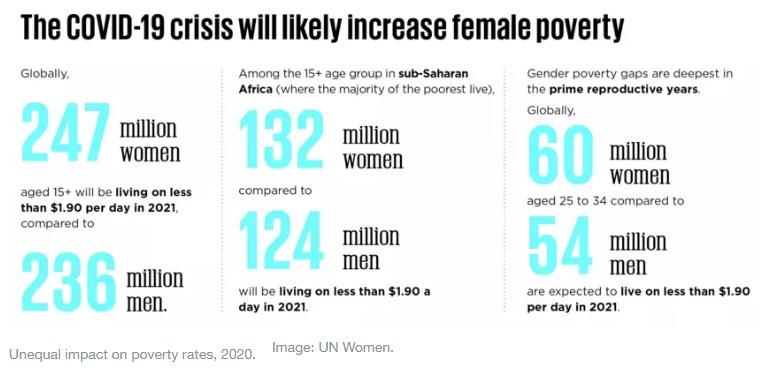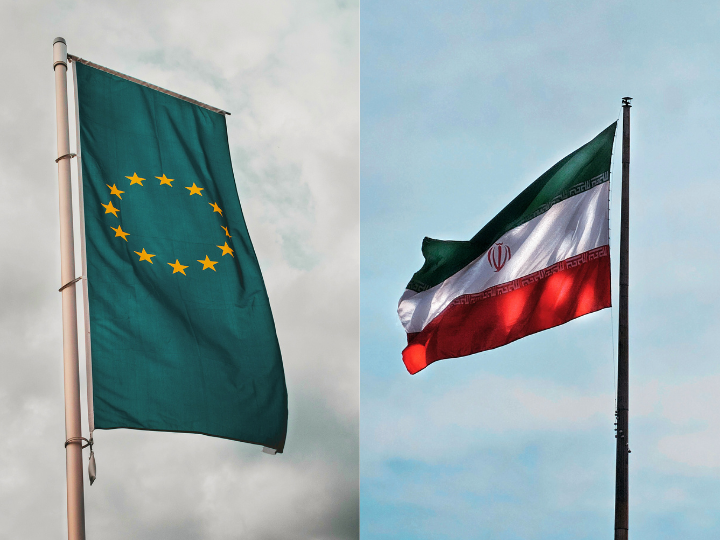by Dharrnesha Inbah Rajah*
A year and a half since the start of the pandemic and women continue to be disproportionately impacted due to an inadequate gender responsive recovery from the health and socioeconomic crises.
In the labour market, more women than men were unemployed due to the pandemic. While men’s employment in 2021 is expected to recover to 2019 levels, women’s employment recovery is likely to fall short by 0.9% compared to 2019 levels. Additionally, only 43.2% of global working age women will be employed in 2021, compared to 68.6% of working age men. Put simply, more women are exiting the workforce.

The pandemic has also widened the global gender poverty gap. Poverty rates for women and girls are expected to rise to 12.5% in 2021 (11.7% in 2019) compared to 12.1% for men and boys (11.3% in 2019). By this year, for every 100 men aged 25 to 34 years old in extreme poverty, there will be a corresponding 118 women.
Why are women more vulnerable to the socioeconomic impacts of the pandemic?
In mitigating the widening gender gap, it is pertinent to understand the underlying challenges women face compared to men. These include the burden of care work, unemployment statistics reporting, and disproportionate female representation in certain economic sectors.
Traditionally, women have carried the brunt of unpaid caregiving and domestic work within families. Even before the pandemic, women already did three times the amount of care work compared to men – or an additional 8.3 billion hours of unpaid work. With schools and childcare centres shut for most of the pandemic, the burden of unpaid childcare once again rested heavily on women’s shoulders. Last year, women took on 173 additional hours of unpaid childcare, compared to only 59 additional hours by men.
This increase in unpaid care work is a crucial factor in the declining women’s labour force participation rate, even as employment is indicating signs of recovery in several countries. However, the actual decline is often much larger than the reported figures. The unemployment data reporting obscures the declining numbers of women in the workforce by definition and construct, in both developed and developing countries.
In the US, a woman who has left the labour force entirely and is not job hunting is no longer counted in monthly unemployment rates. In Malaysia, a woman is still considered employed if she switches from paid work to unpaid family work, as long as it is for at least one hour per week. Unpaid family work remains vaguely defined. Coupled with reporting constructs that overlook the growth in unpaid work by women, enumerating the economic losses faced by women and countries becomes a daunting task.
The economic impact experienced by employed women in the manufacturing, services, and social sectors have been exacerbated by the pandemic. In fact, women account for 70% and 75% of the health and care, and garment supply chain workforces, respectively. Some working age women are not even captured in employment data due to participation in the informal economy. With 63% of the informal economy workforce comprised of women, they are more vulnerable to precarious income and safety arrangements, and lack access to social protection.
Putting women at the centre of recovery efforts
For an inclusive recovery, we need to invest in women. Governments need to adopt gender responsive policies that are long overdue.
There needs to be a rethinking of care work. The care economy remains largely invisible and inadequately resourced. To reduce further gender gap losses, targeted fiscal spending should be channelled to improve care leave and welfare interventions. Specifically, it is crucial to expand the coverage of care policies for longer and more evenly designed maternity and paternity leaves, and for more flexible paid parental leaves.
Currently, only 117 countries legally guarantee at least 14 weeks of paid maternity leave, and only 79 countries legally mandate paid paternity leave. An added complexity with paternal leaves is the persistently low uptake. To encourage a paradigm shift in attitudes on paternal leaves, compensations such as tax credits and cash transfers can be used as short-term nudges.
More expansive care policy coverage is crucial for the promotion of equality in employment. These should pave the way for long-term policy measures such as strengthening non-discrimination labour laws to reduce gender wage gaps and enable easier transition back into the workforce for women with employment breaks due to care responsibilities. Basic legal frameworks enabling women’s economic inclusion is non-negotiable.
Other interventions include sustainable provisions of care services. One such policy is developing training programmes for women to run community day-care and pre-school centres with the support of state and local welfare agencies. These centres can also be expanded to provide childcare and nutrition guidance for new and young parents to reduce the time spent by women on childcare, and to encourage healthier division of care work at home.
While we shift to living with the unprecedented health, economic, and social impacts of the pandemic, the widening gender gap cannot take the same approach. Women need to be at the centre of recovery and growth efforts if we are truly serious about a brighter and more equitable future for all.
*Global Shaper, Kuala Lumpur Hub
**first published in: www.weforum.org




 By: N. Peter Kramer
By: N. Peter Kramer
